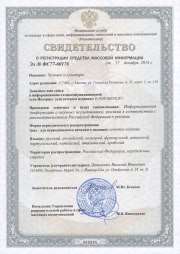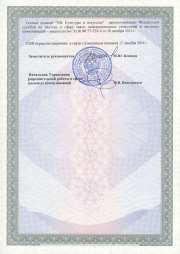|
MAIN PAGE
> Back to contents
Man and Culture
Reference:
Khe Y.
The problem of intercultural communication in education: culture shock and adaptation to it.
// Man and Culture.
2023. № 5.
P. 17-28.
DOI: 10.25136/2409-8744.2023.5.43838 EDN: XRVSUM URL: https://en.nbpublish.com/library_read_article.php?id=43838
The problem of intercultural communication in education: culture shock and adaptation to it.
Khe Yan'li
Postgraduate student, Department of Regional Studies, Moscow State University
Russia, Moscow, Moscow State University, Mendeleevskaya str., 1

|
linda.he@yandex.ru
|
|
 |
Other publications by this author
|
|
|
DOI: 10.25136/2409-8744.2023.5.43838
EDN: XRVSUM
Received:
18-08-2023
Published:
19-09-2023
Abstract:
The subject of this article refers to the phenomenon of culture shock based on data obtained from a survey of Chinese students studying at the Faculty of Foreign Languages and Area Studies of Lomonosov Moscow State University. The signs of culture shock as a social phenomenon and mental state are listed. The reasons leading to culture shock and its consequences are considered. In addition, the history of studying this issue by Russian and foreign scientists is widely presented. The scientific novelty of the work lies in the use of qualitative and quantitative methods for collecting and analyzing the information obtained, as well as the development of approaches to prevent such a situation. The study shows that signs of culture shock are inherent in all Chinese students in Russia to varying degrees. However, through analysis of detailed data, it is discovered that individual differences in intercultural adaptation are more significant. Culture shock is not directly related to gender, but has a certain connection with specialties and courses. Meanwhile, this phenomenon has a greater degree of connection with character and the ability to intercultural communication (the ability to solve problems when faced with them). In addition, measures are proposed aimed at preventing this condition, as well as overcoming the communication barrier, improving intercultural communication and developing international education.
Keywords:
culture shock, cultural adaptation, ways to overcome culture shock, international education, intercultural communication, Oberg, signs of Culture Shock, chinese students, overcoming the communication barrier, Faculty of Foreign Languages and Area Studies MSU
This article is automatically translated.
You can find original text of the article here.
Due to the development of Sino-Russian relations, intercultural communication in the field of education is rapidly developing. In Russia, Chinese students face a number of difficulties that cause cultural shock. Cultural shock occurs between two different cultures and is a social phenomenon in the process of intercultural adaptation. After the arrival of Chinese students in Russia, great changes are taking place in their educational and cultural life, which encourages them to actively integrate into the Russian cultural and educational environment. The problem of cultural shock among foreign students in Russia has not been studied enough yet. As noted in the article by Terentyev et al. “Three challenges to the Russian system of doctoral education: Why only one out of ten doctoral students defends thesis?” [10], this problem really exists and needs to be solved. In this regard, our goal is to collect more information on this issue and try to find a solution to help Chinese students better understand the phenomenon of cultural shock and learn ways to overcome it for a successful graduation from university in Russia. Thus, the scientific novelty of the work consists in the application of qualitative and quantitative methods of collecting and analyzing the information received, as well as the development of ways to prevent such a situation. Intercultural communication and culture shock Recently, a lot has been said about various issues of intercultural communication as a dialogue of cultures. The scientific community is also well aware of when the term MCC first appeared and who its authors are. The term "intercultural communication" was proposed by the American scientist E. Hall after the Second World War. E. Hall believed that difficulties in communication between representatives of different ethnic groups and cultures are associated with different ways of perceiving the world [1, p. 122]. Currently, intercultural communication is considered as communication between individuals and groups belonging to different cultures. The term "culture shock" was introduced into scientific circulation in 1960 by the American researcher K. Oberg. In his opinion, culture shock is "a consequence of anxiety that appears as a result of the loss of all the usual signs and symbols of social interaction" [4]. When entering a new culture, a person has very unpleasant feelings. At first, scientists considered cultural shock to be a kind of "mental illness" and a difficult problem to solve, and this mostly concerned the negative impact of cultural shock on intercultural communication. A person is tense and anxious, his communicative abilities are reduced, there is a more serious tension with others, a person will be inclined to alienation and avoidance of communication, and at this time conflicts easily arise in this situation. According to this point of view, the main cause of cultural shock is a person's personal weakness or inability to cope with problems, and the main method of getting rid of such a condition is psychological counseling or psychotherapy. Later, more and more researchers of intercultural communication considered cultural shock as a positive phenomenon. P. Adler believed that cultural shock is a kind of intercultural learning, self—knowledge and change [5]. R. Brislin also emphasized that "cultural shock is not proof of a person's inability to adapt to a new culture, but rather a way of interaction with people in the destination country, in which he really experiences differences and faces differences in his life. Students who have not experienced cultural shock are so rigid that they do not see cultural differences that really exist" [4]. In the sociological encyclopedia, cultural shock is described as an essential element of cultural dynamics, depriving the usual cultural standards of unambiguity, contributing to the renewal of traditional cultural systems due to the "invasion" of foreign cultural elements, stimulating innovative activity through the interaction of various cultural traditions and cultural practices, contributing to changes in the social structure of society [7]. Consider the relationship between culture shock and cross-cultural communication. From the point of view of intercultural psychology, culture shock has both positive and negative consequences. On the one hand, cultural shock is considered as a psychological problem and an obstacle to intercultural communication. On the other hand, it is an inevitable experience of intercultural communication and a positive factor of personal growth. Therefore, the right way to deal with culture shock is psychological preparation, participation in trainings and improvement of social skills related to cultural adaptation. It is clear that culture shock is not a special phenomenon, but part of a natural life experience. Culture shock can have a positive impact on personal life and cross-cultural communication, for example, to gain a new perspective of self-knowledge, a better understanding of differences in values and views on life in different cultures. Thinking becomes more active, objective and open, emotions are richer, character is strengthened, independence and maturity appear, stronger interpersonal communication skills develop and a stronger ability to adapt to a new cultural environment. Signs and cases of culture shock
The emergence of the phenomenon of cultural shock is mainly due to the fact that the cultural rules familiar in the past are no longer applicable in the new environment, and the new cultural model is not a refuge for outsiders, but a place of adventure. The uncertainty and ambiguity caused by this change makes people psychologically stressed and anxious. Culture shock is mainly manifested by psychological discomfort, and sometimes by physiological reactions. Based on the definition of the concept of “culture shock” by such researchers as K. Oberg [12], P. Adler and others, the following list of those signs that are characteristic of this phenomenon was compiled [6]. As part of the survey, we tried to identify students: 1) the emergence of feelings of loneliness and helplessness; 2) the feeling of emotional distancing from family and friends; 3) increased irritability or anxiety; 4) unwillingness to have contact with strangers; 5) hostility towards representatives of another culture; 6) fear for your safety and inviolability of your person or property; 7) obsession with hygiene and personal health; 8) a jet of need for any manifestations of connection with native culture; 9) feeling of physical pain or discomfort. The degree of culture shock will vary from person to person and from situation to situation. Some students experience a culture shock that is mild and lasts only a few days, while others experience a culture shock that can last for weeks and persist for a longer time. Some students experience only psychological or emotional discomfort, while others have physical illnesses such as headaches and abdominal pain caused by psychological anxiety. Before proceeding to the results of the study, it is necessary to describe its methodology and survey conditions: 24 people participated in the survey, including 6 graduate students of the 2nd year of study (until June 30, 2023) in the age range from 24 to 34 years. The survey was conducted orally via Veichat as a conversation, in particular, two graduate students had not studied at MSU before, and four studied at different faculties of MSU. The rest of the students were students and masters of the MSU FIYAR and passed a written online survey via the Internet (see the specific content below). These graduate students together with the author of the article spent almost two years of joint distance learning, and also studied the topic of this article themselves, therefore, according to the author, these factors can guarantee the relative reliability of the information. And the rest of the participants answered in writing the 9 questions described above.
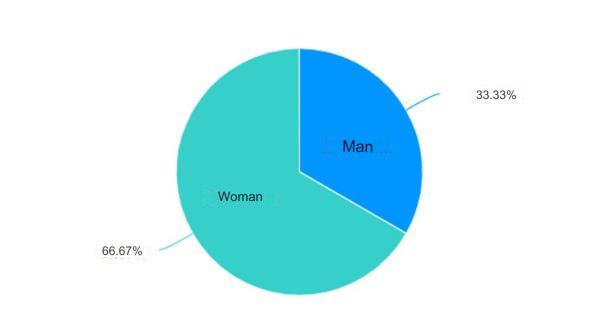
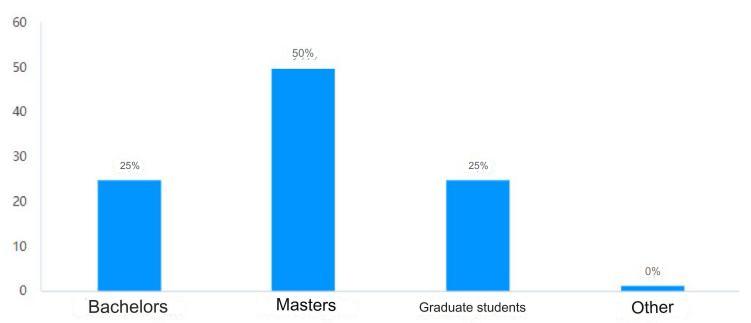
According to the author's research and oral interviews, it was found that among the interviewed students of the Faculty of Foreign Languages and Regional Studies of Moscow State University, almost all had some signs of cultural shock of varying degrees of intensity. The most frequent sign of "culture shock" was a feeling of loneliness: 6 people out of 24 students (this number is 25%) experienced a strong feeling of longing for family; 9 more people complained about a similar feeling, albeit in a lighter form (this is 37.5%). Also, the majority of those who passed the survey - 87.5% - missed home because of the difficulties experienced after arriving in Russia, and another 37.5% often experienced sadness and excitement. Despite the fact that 58.33% of 24 students somehow felt fear of being deceived by non-native and Chinese people, 37.5% of respondents are actively interested in Russian culture and 45.83% do not avoid communication with speakers of other cultures. 66.67% have no hostility towards representatives of other cultures at all. Interestingly, students rarely express an urgent need for any manifestations of connection with their native culture. 70.83% of people monitor their health – this was largely influenced by the fact that many students got sick with coronavirus upon arrival in Moscow, and monitor nutrition. 58.33% to some extent felt physical pain or discomfort. 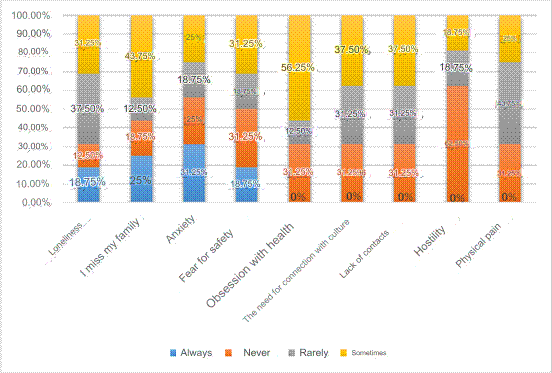
(Tab.3. Signs and cases of culture shock) In this study, 4 out of 6 graduate students of the 2nd year of study had previously studied at the Moscow State University and they were in Moscow, so it is not difficult for them to live and study in a familiar place, but two graduate students were often ill, one of them had already stopped studying. Another graduate student has already married and has a child, so when she arrived in Moscow in mid-January 2023, she missed her son (he is only 2 years old.). The sixth graduate student, although not the first time she came to Russia, was dealing with teachers for the first time. She also faced a culture shock. First of all, she was plunged into sadness and depression by her relationship with teachers. Compared to graduate students, other Chinese students studying at FIYAIR are even younger, and they usually went home 2 times a year. However, by analyzing detailed data, it is found that individual differences in intercultural adaptation are more significant. So, the analysis of the data obtained allows us to draw the following conclusions. 1. The described signs of cultural shock are inherent in all Chinese students in Russia to varying degrees.
2. Culture shock is not directly related to gender, but has a certain connection with specialties and courses. 3. Culture shock has a great degree of connection with character, the ability to communicate cross-culturally (the ability to solve problems when faced with them). In general, the results show that Chinese students and postgraduates studying in Russia have a positive attitude to integration in the process of intercultural adaptation. Ways to overcome cultural shock According to K. Ward, S. Bochner and A. Fernham, intercultural adaptation can be divided into two categories: psychological and socio-cultural. Psychological adaptation, based primarily on affective reactions, refers to a sense of well-being or satisfaction during cross-cultural transitions. Sociocultural adaptation, on the other hand, is in the behavioral domain and refers to the ability to "adapt" or interact effectively in a new cultural environment [11, p. 57]. And according to the American anthropologist F. Bock, there are four ways (ghettoization; assimilation; intermediate, consisting in cultural exchange and interaction; partial assimilation) to resolve the conflict arising from cultural shock [5]. I. B. Ignatova and V. G. Burykina add that the integration of foreign students into new socio-cultural conditions is defined as more effective a way to overcome cultural shock [3]. In accordance with the opinions of scientists and based on the personal experience of the author of the article, six ways to overcome cultural shock are proposed. Some of these strategies are aimed at changing the behavior of the Chinese student, while others are aimed at changing his perception. These methods include the following:
1. Willingness to learn intercultural learning and to be trained in a different atmosphere of another culture. Knowledge of Russian culture is the first step towards improving cultural adaptation and intercultural communication skills. Knowledge of Russian culture will increase self-confidence, reduce anxiety and a sense of loss in a new environment, help to communicate with others and build good interpersonal relationships. Knowledge about Russian culture includes local history, the specifics of the education system between the Russian Federation and the PRC[8], customs and habits, etc. Special attention should be paid to understanding cultural values, customs, norms of behavior, peculiarities of language use and non-verbal behavior, etc. It would be good if special courses were arranged for Chinese first-year students even before they left for Russia. 2. Learning the Russian language. Language is the most important means of communication. The language barrier can make people feel helpless and frustrated, which can exacerbate the phenomenon of culture shock and complicate the adaptation process. According to the author's survey, the biggest difficulty for Chinese students in cross-cultural adaptation abroad is precisely the language barrier. Russian Russian For students with a zero level of Russian language who want to study at a university, you need to know the Russian language. If they do not speak Russian well, then they need to take special courses. For example, Professor Pavlovskaya A.V. FIYAIR of Moscow State University mentioned earlier in her article that it is necessary to do special testing for admission to Moscow State University [6, p. 62]. After all, they must have the book and spoken style layers of the language, that is, to master the specialty, they need to study bookish Russian, outside of the lesson they still need to know youth slang for better communication and understanding (for example, the study of Professor V.S. Elistratov [2] and his student He Yanli [9] slang and jargon as an informal language). Speaking the language of the destination country can increase people's ability to survive abroad, improve their quality of life, make more friends and increase their self-confidence and sense of accomplishment at work. Thus, learning Russian is a necessity for studying in Russia. 3. Establishing interpersonal contacts. Communication can allow people to understand the local culture deeper and faster, as well as receive emotional support, reduce anxiety and promote cultural adaptation. 4. Search for hobbies. Passion for your favorite things helps to reduce tension and reduce the psychological pressure that has arisen due to various reasons. Watching the local press, television or surfing the Internet in the local language is a good strategy for acculturation, it is not only entertainment, but also an important way to understand Russian culture. 5. Participation in social and cultural activities and sports competitions. By engaging in cultural and sports events and participating in volunteer social activities, a person can not only find like-minded friends and avoid loneliness, but also train his body, improve health and internal discipline. 6. Development of thinking flexibility. If it is impossible to change environmental conditions, it is necessary to use an adaptive strategy. For example, you can gradually change your habits, and then your way of thinking. A course on self–education and the development of new skills may also be useful - this will mitigate the consequences of cultural shock.
Conclusion Thus, the article presents the data of a survey of 24 Chinese students, the results of the analysis of these data and the main recommendations for solving the problem of cultural shock are given. First of all, we should pay special attention to the fact that during the study it was revealed that the described signs of cultural shock are characteristic of all Chinese students in Russia, but to varying degrees. As for ways to combat this phenomenon, in our opinion, it is the development of flexibility of thinking and the attitude to a positive perception of another culture that are the most effective ways to solve the problem of cultural shock.
The work was carried out with the financial support of the State Committee of the People's Republic of China for the Management of the Study Abroad Fund. (This work was funded by China Scholarship Council.) Special thanks to Elistratov V.S., Proshina Z.G., Kirzhanova S.V., Shishkin A.N., Nikiforova E.I.
References
1. Grushevitskaya, T. G., Popkov, V. D., & Sadokhin, A. P. (2002). Fundamentals of intercultural communication. Moscow: Unity-Dana.
2. Elistratov, V. S. (2013). Jargon of Russian capitalism at the beginning of the 21st century. As an object of lexicographic description (dictionary project). Bulletin of Moscow University. Series 19. Linguistics and Intercultural Communication, 4, 32-47.
3. Ignatova, I. B., & Burykina, V. G. (2010). Culture shock and ways of overcoming it by foreign students. Bulletin of the Kostroma State University. Series: Pedagogy. Psychology. Sociokinetics, 16(4), 236-239.
4. Kulikova Olga Andreevna (2017). Culture shock: socio-psychological adaptation to a new cultural environment. University Bulletin, 5, 190-195.
5. Piterova Anna Yurievna (2014). Culture shock: features and ways to overcome. The science. Society. State, 4, 159-172.
6. Pavlovskaya Anna Valentinovna (2020). Interaction of cultures in international education: On the problems of intercultural communication in the global world. Bulletin of Moscow University. Series 19. Linguistics and Intercultural Communication, 2, 52-65.
7. Sokolova, G. N. (2003). Intelligentsia//Sociology: Encyclopedia/Comp. AA Gritsanov, VL Abushenko, GM Evelkin etc. Mn.: Book House.
8. Yanli, H., & Shishkin, A. N. (2023). Differences in concepts and methods of language teaching and learning between china and russia in the field of intercultural communication. In Language. Culture. Translation. Communication (pp. 231-235).
9. Yanli, H. (2022).The specificity translation of Russian slangisms into Chinese. Communication codes in the intercultural space as a means of forming the general humanitarian competencies of a new generation of people: Proceedings of the II Interdisciplinary Scientific and Practical Conference (pp. 231-235).
10. Terentev, E., Bekova, S., & Maloshonok, N. (2021). Three challenges to Russian system of doctoral education: Why only one out of ten doctoral students defends thesis? International Journal of Chinese Education, 10(1), 22125868211007016.
11. Colleen, A. W., Bochner, S., & Furnham, A. (2001). The psychology of culture shock. Routledge.
12. Oberg, K. (1960). Practical Anthropology. New Mexico, 400.
First Peer Review
Peer reviewers' evaluations remain confidential and are not disclosed to the public. Only external reviews, authorized for publication by the article's author(s), are made public. Typically, these final reviews are conducted after the manuscript's revision. Adhering to our double-blind review policy, the reviewer's identity is kept confidential.
The list of publisher reviewers can be found here.
In the journal "Man and Culture", the author presented his article "The problem of intercultural communication in education: cultural shock and adaptation to it", which conducted a study of the adaptation and integration of Chinese students into the Russian educational and cultural environment. The author proceeds in studying this issue from the fact that due to the development of Chinese-Russian relations, intercultural communication in the field of education is rapidly developing. The author notes the presence of some difficulties faced by Chinese students in Russia, which leads to cultural shock in the process of intercultural adaptation. The relevance of the study determines the current development of Russian-Chinese relations. The practical significance of the study is to help Chinese students overcome the cultural shock of obtaining higher education in Russian higher education institutions. Unfortunately, the author has not substantiated the scientific novelty of the study. The methodological basis of the study was an integrated approach containing methods of analysis and synthesis, cultural analysis, and interviews. The theoretical basis of the research is the works of such researchers as E. Hall, P. Adler, K. Oberg, O.A. Kuleshova, I.B. Ignatov, etc. Accordingly, the purpose of this study is to analyze the phenomenon of cultural shock that occurs among representatives of others in the process of receiving education abroad. Based on the provisions of the works of E. Hall, K. Oberg, P. Adler, the author examines the essence of the phenomenon of cultural shock from both a negative and a positive point of view, describes the causes of its occurrence, characteristic signs and possible consequences. The author is of the opinion that cultural shock can have a positive impact on personal life and intercultural communication, on gaining a new perspective of self-knowledge, a better understanding of differences in values and views on life in different cultures. Thinking becomes more active, objective and open, interpersonal communication skills and the ability to adapt to a new cultural environment develop. The author has developed a methodology for the empirical study of the manifestation of cultural shock: an oral survey and a written online survey. 24 people participated in the survey, including 6 graduate students of the 2nd year of study. According to the author's research and oral interviews, it was found that among the interviewed students of the Faculty of Foreign Languages and Regional Studies of Moscow State University, almost all had some signs of cultural shock of varying degrees of intensity. According to the research and oral interviews, the author found that among the interviewed students of the Faculty of Foreign Languages and Regional Studies of Moscow State University, almost all had some signs of cultural shock of varying degrees of intensity. However, by analyzing detailed data, the author discovers that individual differences in intercultural adaptation are more significant. Cultural shock is not directly related to gender, but has a certain connection with specialties and courses and has a greater degree of connection with personal character, the ability to communicate cross-culturally, the ability to solve problems when faced with them. Based on research on the intercultural adaptation of K. Ward, S. Bochner and A. Fernham, the socio-cultural adaptation of F. Bock, I. B. Ignatova and V.G. Burykina, as well as on his own observations, the author has developed six ways to overcome cultural shock. Some of these strategies are aimed at changing the behavior of the Chinese student, while others are aimed at changing his perception. The methodology includes such techniques as learning the Russian language, participating in social activities, establishing personal contacts and others. Unfortunately, the author of the article does not present a conclusion containing the key provisions of the studied material. It seems that the author in his material touched upon relevant and interesting issues for modern socio-humanitarian knowledge, choosing a topic for analysis, consideration of which in scientific research discourse will entail certain changes in the established approaches and directions of analysis of the problem addressed in the presented article. The results obtained allow us to assert that the study of the factors of the emergence and overcoming of cultural shock in the process of intercultural communication and learning is of undoubted theoretical and practical cultural interest and can serve as a source of further research. The material presented in the work has a clear, logically structured structure that contributes to a more complete assimilation of the material. An adequate choice of methodological base also contributes to this. However, the bibliographic list of the study consists of 12 sources, including foreign ones, which seems sufficient for generalization and analysis of scientific discourse on the studied problem. The author has fulfilled his goal and obtained certain scientific results. However, the article needs to be corrected. It should be stated that the article may be of interest to readers and deserves to be published in a reputable scientific publication after these shortcomings have been eliminated.
Second Peer Review
Peer reviewers' evaluations remain confidential and are not disclosed to the public. Only external reviews, authorized for publication by the article's author(s), are made public. Typically, these final reviews are conducted after the manuscript's revision. Adhering to our double-blind review policy, the reviewer's identity is kept confidential.
The list of publisher reviewers can be found here.
Even in ancient times, even a few travelers encountered various situations that were radically different from their usual daily routine. It is no coincidence that the names of navigators and explorers have gone down in history as an example of courage and heroism: these are Athanasius Nikitin, Marco Polo, Herodotus, Evdox, etc. Of course, ancient and medieval travelers did not always return to their homeland and tell the truth about the countries they saw: Reilly, and F. By the way, Orellana, albeit in different ways, nevertheless reported not only distorted facts, but also outright tall tales. Today, thanks to long-haul aviation and the Internet, the world has become much closer, but even at the end of the XIX century. mail from Europe to Australia went for up to six months. In this regard, the problems of intercultural practices among those students who come to Russia, primarily from China, Vietnam and the DPRK, are of interest. And the authorities of the Primorsky Territory are discussing the issue of exchanging schoolchildren for acquaintance with the DPRK. These circumstances determine the relevance of the article submitted for review, the subject of which is cultural shock among foreign students in Russia. The author sets out to consider the definition of "cultural shock", analyze its signs and cases, and identify ways to overcome cultural shock. The work is based on the principles of analysis and synthesis, reliability, objectivity, the methodological basis of the research is a systematic approach, which is based on the consideration of the object as an integral complex of interrelated elements. The scientific novelty of the article lies in the very formulation of the topic: the author seeks to "help Chinese students better understand the phenomenon of cultural shock and learn ways to overcome it for successful graduation from university in Russia." Scientific novelty is also determined by the results of a survey of 24 Chinese students conducted by the author of the reviewed article. Considering the bibliographic list of the article as a positive point, its scale and versatility should be noted: in total, the list of references includes 12 different sources and studies. The undoubted advantage of the reviewed article is the involvement of foreign literature, including in English, which is determined by the very formulation of the topic. Among the studies attracted by the author, we note the works of I.B. Ignatova and V.G. Burykina, O.A. Kulikova, A.Y. Piterova, which focus on various aspects of the study of cultural shock. As a remark, we point out that the author refers to the views of a number of authors not from primary sources (for example, E. Hall, K. Oberg), citing even a textbook as references. But the bibliography is important both from a scientific and educational point of view: after reading the text of the article, readers can turn to other materials on its topic. Thus, in our opinion, the bibliography of the article needs to be supplemented. The style of writing the article can be attributed to scientific, at the same time understandable not only to specialists, but also to a wide readership, to anyone interested in both the problem of cultural shock in general and cultural shock among foreign students in Russia in particular. The appeal to the opponents is presented at the level of the collected information received by the author during the work on the topic of the article. The structure of the work is characterized by a certain logic and consistency, it can be distinguished by an introduction, the main part, and conclusion. At the beginning, the author defines the relevance of the topic, shows that "the degree of cultural shock will vary from person to person and from situation to situation." The paper shows that "according to the author's research and oral interviews, it was found that among the interviewed students of the Faculty of Foreign Languages and Regional Studies of Moscow State University, almost all had some signs of cultural shock of varying degrees of intensity." It is noteworthy that "culture shock is not directly related to gender, but has a certain connection with specialties and courses." The main conclusion of the article is recommendations to students on overcoming cultural shock, including learning the Russian language, participating in social and cultural activities and sports, finding hobbies, etc. The article submitted for review is devoted to an urgent topic, will arouse readers' interest, is provided with 3 tables, and its materials can be used both in training courses and within the framework of Russian-Chinese university cooperation. At the same time, there are comments on the article: 1) It is necessary to supplement the bibliography with primary sources. 2) The bibliography of the article should be brought into line with the requirements of GOST. 3) In the gratitude section, an exclamation mark looks obviously superfluous ("Special thanks to Elistratov V.S., Proshina Z.G., Kirzhanova S.V., Shishkin A.N., Nikiforova E.I.!") After correcting these remarks, the article can be recommended for publication in the journal "Man and Culture".
Link to this article
You can simply select and copy link from below text field.
|
|




